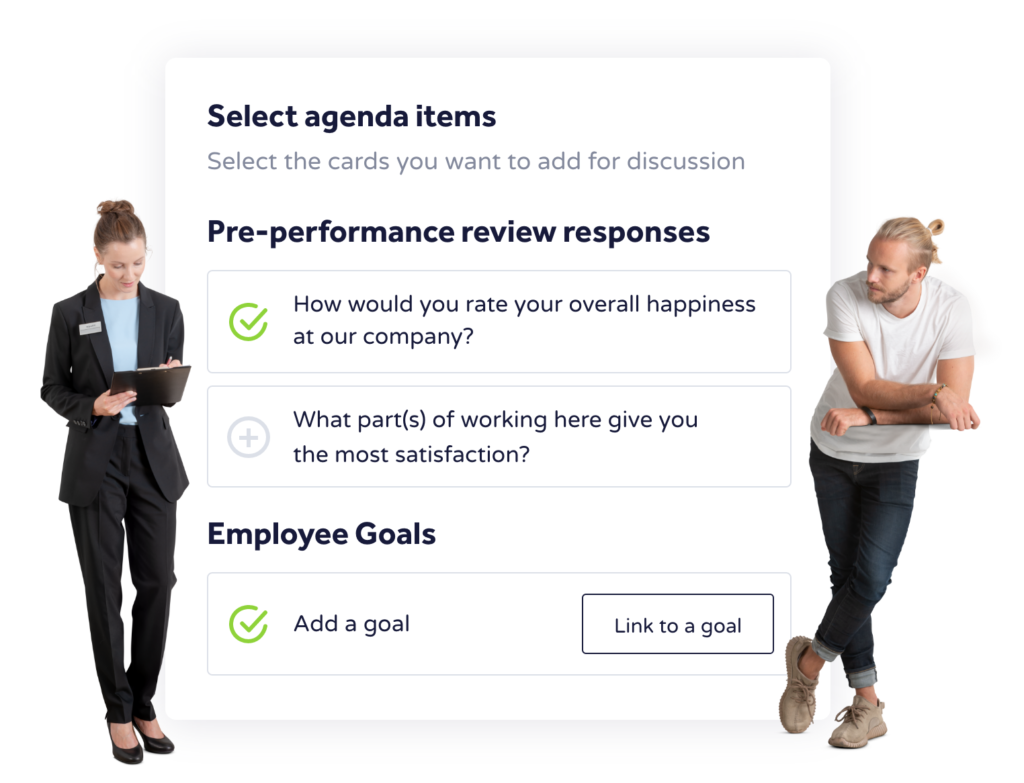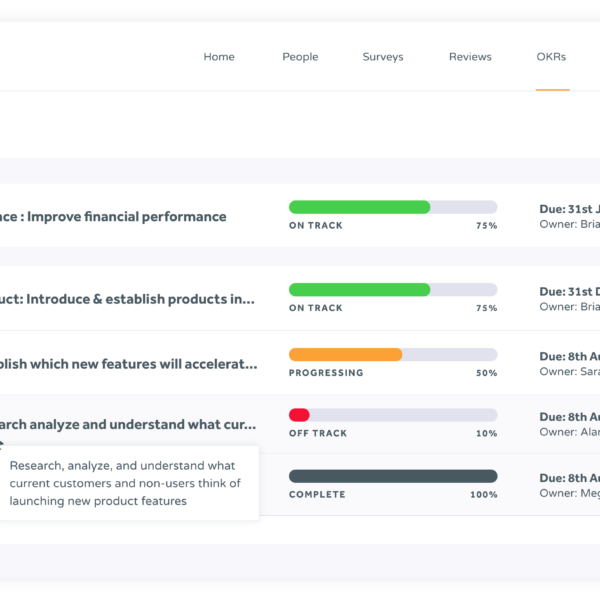Only 41% of employees are currently performing optimally, and just 29% of HR leaders feel confident that their organisation’s current processes are effective at helping employees achieve and sustain their best possible performance according to research from Gartner. So what steps can you take to boost performance and close this gap?
Performance management is a critical function in any business and ensures that your people are aligned with, and meeting the expectations of your organisation and working towards common goals and objectives.
While the specific processes and procedures of performance management will likely vary depending on the company, industry, and culture, there are some key principles that you should keep in mind to ensure the success of your performance management approach.
Define clear goals and expectations
The first step in effective performance management is to set clear goals and expectations for your people. This means defining what success looks like in each role, what outcomes are expected, and what behaviours and attitudes are valued.
These goals and expectations should be communicated clearly and regularly so that employees understand what is expected of them and how they will be evaluated. This should be done during the onboarding process, in 1:1 meetings, and in team conversations.
Provide ongoing, regular feedback
In our recent webinar with Lucy Adams “A Fresh Approach to Performance Management”, she said traditional performance management cannot work. According to Lucy, an annual review is pointless and demoralising. It is worse than doing nothing because a poorly equipped manager giving feedback in one huge lump of feedback will instantly shut your people down. They will be immediately in “fight, flight or freeze mode exactly when we want them to be curious, open and leaning in.”
Therefore, it is essential that your managers provide ongoing attention and feedback to staff. You should encourage managers to provide regular feedback to their employees, both positive and constructive, wiith multiple methods. This feedback should be specific, timely, and actionable, and should take place as a collaborative two-way conversation.
Use more than one method to evaluate performance
So what methods should you use? Performance is often evaluated as an annual or quarterly survey, where employees are scored according to a few different criteria and are often told they “meet expectations”.
According to Lucy Adams, this approach is highly ineffective and assumes people follow a normal distribution curve. Instead, you should take a process-lite and agile approach. Ratings should be replaced, or supplemented with regular conversations, self-assessment, team-driven feedback, and more employee-driven. This allows for a comprehensive and representative view of performance and helps to minimise biases and blind spots.
Create a culture of continuous learning
Employees should be encouraged to seek out opportunities for growth and development and to continually improve their skills and knowledge. By removing the parent-child dynamic that we often see in performance management, you can encourage employees to reflect on their own motivations for improving performance.
HR can foster a culture of continuous learning by offering training and development programs, creating opportunities for employees to learn from each other, and providing resources or allocating a budget for individuals to seek out their own learning content.
Recognise and reward performance
Employees who perform well should be recognised and rewarded for their contributions, and this can massively help motivate employees and reinforce positive behaviours. It can take many forms, such as bonuses, promotions, or public recognition. But without ratings, how can managers effectively identify these people?
According to Lucy Adams, ratings in the traditional approach are based on biased and inconsistent data, not because our managers are poor, but because they are human and our ability to rate people is fundamentally flawed.
Instead, regular conversations can provide a far clearer sense of your top performers and can change throughout the year. Talking to your people and identifying where they are excelling, and where they need additional support is far more effective for rewarding their performance than rewarding all your employees who received a tick in the “exceeds expectations” box on their annual appraisal.
Address performance issues promptly
Why wait until the end of the year or the end of the quarter to deal with poor performance? When performance falls below expectations, it is important to address the issue quickly and identify what your people need to be successful.
This can be done through coaching, training, or other corrective actions. HR should work with managers to identify the root causes of performance issues and help develop a plan for improvement.
Provide opportunities for career development
Employees are more likely to stay engaged and motivated when they see opportunities for career growth and advancement. HR professionals should work with managers to identify potential career paths for employees and provide opportunities for them to develop new skills and take on new responsibilities.
For example, River Island has taken a new approach to performance management by asking employees to drive their own career development and requesting career conversations at times that suit them. This puts the onus on the employee to be proactive and engaged in their own career development.
Emphasise teamwork and collaboration
Effective performance management is not just about individual performance; it also involves teamwork and collaboration. As Lucy Adams pointed out, “work is always done in teams, but we insist on 1:1 conversations.”
It can be hugely beneficial to focus on the team when we approach performance reviews. For example, the BBC created more honest, open team-based performance discussions by regularly reviewing the best-performing areas of the organisation as a team, rather than in 1:1s. The leader will always kick off the review by reflecting on their performance first, which creates a sense of psychological safety for the team and lets them know it is okay to make mistakes and learn from them.
Ensure you are encouraging managers to foster a sense of team spirit and openness by sharing their own experiences amongst their team.
Ensure everyone is well-prepared
There is little more demoralising than turning up to a performance review where one or both parties are completely unprepared. This can be hugely damaging to morale, so it is imperative that employees and managers are well-equipped for these conversations.
Running a pre-performance review questionnaire will ensure both your managers and employees have the information they need ahead of their 1:1.
Communicate effectively with an Intelligenda®️

WeThrive makes this simple with our Intelligendas®️. With easy access to recent survey results, goals, actions and OKRs managers build a custom Intelligenda®️ prior to a 1:1. Employees can add anything they want to discuss so the conversation is focussed precisely where it needs to be – to deliver the most value.
Getting started…
Effective performance management is critical for the success of any organization, and HR professionals play a key role in ensuring that it is done well. By following these 10 principles, you can help to create a culture of high performance, continuous learning, and collaboration that benefits your people and your organisation.
Book a demo to learn how WeThrive can help you improve performance management today, or read our white paper “How to Ace Performance Management: Your 7 Step Guide“.




